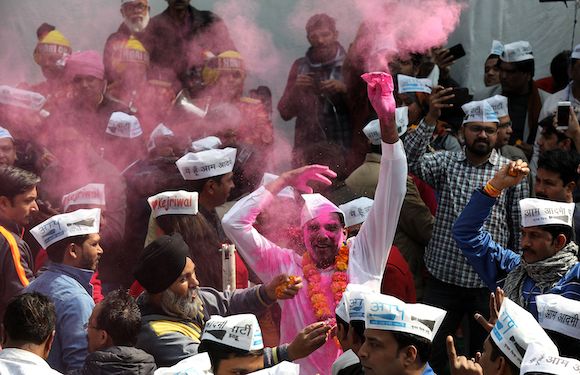Less than a year ago, Indian Prime Minister Narendra Modi looked impregnable. He had won re-election in a landslide, shifted the country decisively to the right and decimated the main opposition Congress party. His sectarian decision to change the status of Kashmir and propose a new citizenship law provoked cries of outrage, but did not appear to dent his popularity.
But February’s state elections in Delhi have dealt Modi a blow—and may have shown his opponents how he can eventually be defeated at national level. The Aam Aadmi Party (AAP)—or Common Man Party—won 62 out of 70 seats, and its leader, Arvind Kejriwal, has emerged as one of the most important political faces in India. It was Kejriwal’s third successive victory in Delhi, and his hat-trick has prompted some commentators to wonder whether he could be the politician to eventually challenge Modi’s dominance.
Kejriwal sought votes for his party in Delhi by making a case for his performance as the state’s chief minister. He highlighted his popular policies of free electricity and water, education and health reforms as well as his overall governance. His supporters talk of a “Delhi model” that can potentially become a rival to the “Gujarat model,” which successfully propelled Modi towards national glory.
Perhaps more important was what he didn’t do. It was after his victory in 2015 that Kejriwal first started dreaming of challenging Modi directly, trying to grow his new party in other states. But he failed to make an impression elsewhere, and his attacks on Modi ended up alienating a large part of the Indian populace that remains in awe of the prime minister. After getting a serious drubbing in last year’s parliamentary elections, Kejriwal and his party recognised the need to temper their hubris. And as the Delhi elections dawned, a new Kejriwal emerged.
He and his party refrained from talking about their national ambitions and toned down their direct attacks on Modi. Kejriwal talked of Delhi more and appealed to voters as “Delhi ka beta [Delhi’s son].” This nice guy image of Kejriwal was more in sync with the Delhi voters who were repulsed by the aggressive and confrontational approach of local BJP leaders. The BJP did not have a single local leader who could match up to Kejriwal’s credibility.

What was most significant was Kejriwal’s makeover into a politician who understood the shift in the underlying mood of Delhi voters. Rather than opposing Modi’s nationalism, he aped it, in particular asserting his Hindu identity. After previously rejecting support from religious leaders, he chose to project himself as a devotee of Lord Hanuman, the most ardent follower of Lord Ram. He also supported the sectarian move to build a grand temple in Ayodhya, a site that was previously home to a mosque before it was destroyed by Hindu mobs in 1992, sparking riots that killed nearly 2,000 people. After rebranding himself as a nationalist, he supported the Modi government’s divisive constitutional tinkering in Jammu and Kashmir, and he treads cautiously on the Citizenship Amendment legislation that human rights groups say discriminates against Muslims.
The centre of gravity of Indian politics has moved to the right and most Indian political parties are struggling to respond to this dramatic shift. The ostensibly secular Congress party, which dominated Indian politics until Modi’s first victory in 2014, is disappearing. In its place, a number of regional leaders are emerging. In Delhi, Kejriwal’s victory does not necessarily spell the end for Modi, but merely testifies to the way the voters, in the American parlance, increasingly “split the ticket”—those same Delhi voters backed Modi at last year’s general election.
For the BJP, the worry is its over-reliance on Modi, or that other parties—as the AAP has demonstrated—might find opportunistic ways to grab and twist parts of the Modi agenda. But there is no doubt as to who is framing the national discourse. Kejriwal might rebrand himself and his party to counter the BJP’s “Hindutva,” but Modi is writing the ground rules. Kejriwal’s victory shows again that others can survive, but only when they play by those rules. Modi and the BJP may have lost Delhi, but their ideology keeps on winning.













